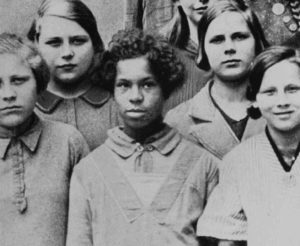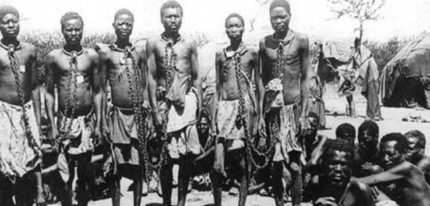
Afro-German girl in Nazi Germany (Public domain)
When one thinks of the victims of Nazi Germany, images of Jews, Roma, the disabled, political dissidents, European prisoners of war and others come to mind. Black people usually do not come to mind, but they did exist, as their story is mostly forgotten.
January 27 marks the commemoration of the Jewish Holocaust, the day that the Nazi death camp Auschwitz was liberated. As Raw Story reported, the European Jewish community is most often acknowledged in this remembrance of the millions who lost their lives, but Black Germans have yet to have their voices heard.
When Hitler came to power, between 20,000 and 25,000 Black people lived in Germany, including soldiers from African colonies and their German wives, and Africans who came as artists, students and entertainers. In addition, there were hundreds of children fathered by Afro-French colonial soldiers in the Rhineland, which was occupied by France after World War I and annexed and returned to Germany in 1936.
In his 1923 book Mein Kampf, Hitler made his views on Black people abundantly clear: “It is a scarcely conceivable fallacy of thought to believe that a Negro…will turn into a German because he learns German and is willing to speak the German language and perhaps even give his vote to a German political party.”
“The fate of black people from 1933 to 1945 in Nazi Germany and in German-occupied territories ranged from isolation to persecution, sterilization, medical experimentation, incarceration, brutality, and murder,” according to the United States Holocaust Memorial Museum. “After World War I, the Allies stripped Germany of its African colonies. The German military stationed in Africa (Schutztruppen), as well as missionaries, colonial bureaucrats, and settlers, returned to Germany and took with them their racist attitudes. Separation of whites and blacks was mandated by the Reichstag (German parliament), which enacted a law against mixed marriages in the African colonies.”
The Nazi Nuremberg laws were a Jim Crow-style system of laws that denied German Jews their personhood and citizenship under German law, and it forbade marriage or sexual relations between aliens and people of German blood. According to Raw Story, Black Germans, many of whom did not have German citizenship, were provided passports that deemed them “stateless negroes.” They were sent to perform forced labor, and Black children were excluded from public schools. While there was no mass internment in concentration camps — around 20 Black Germans were interned, according to camp records, with at least one euthanasia victim — typically Blacks were locked up by the police for so-called deviancy or antisocial behavior, never to be released. In 1937, 400 Rhineland children were sterilized against their will, while other Black Germans fled to avoid the same fate. The Nazi preoccupation with racial purity and pollution led to the harassment and separation of interracial couples, the sterilization of the Black spouse in an interracial family after the couple had a baby, and the breakup of families.
Further, among its first actions, the Nazi regime suppressed Black political movement building, as Afro-German activists were involved in anti-racism and communist organizations.
Meanwhile, there is another genocide committed by Germany that is also forgotten. For example, there was the mass murder of the Herero and Namaqua people in South-West Africa, now known as Namibia. Between 1904 and 1908, 100,000 Herero and 10,000 Nama people — the majority of the respective populations — died in what is considered by historians as the first genocide and the first death camps of the 20th century. German colonialists sent thousands of Namibians into concentration camps, the worst of which was known as Shark Island, or “Death Island,” off the coast of Lüderitz, Namibia. The Black people hauled off to Shark Island were sent there to die, which they did, due to starvation, thirst and hard labor.
Even today, as Germany grapples with the issue of allowing Syrian refugees into the country, the nation still has not come to terms with racism. This, as Black Germans — who number as many as a half million — for years have railed against the racism that has plagued their country. As Time reported in 2009, German filmmaker Günter Wallraff went undercover dressed as a Black man to uncover German racism in his documentary, Black on White.
“Germany is a developing country as far as racism is concerned,” Wallraff said. “There is something close-minded and ill-at-ease about it. Germany is harboring more prejudices than it is ready to accept.”
“What strikes you first of all about the way Germany treats Black people and racism is the avoidance of the subject,” Marina Jones, a doctoral fellow in the history of African-Americans and Germans at the German Historical Institute in Washington told Time. “As an Afro-German, you are often confronted with the situation that you look ‘different’ and people react differently, but then [people] also treat you with something like willful color blindness. You are often deemed a foreigner, so you are alien in your own country.”


